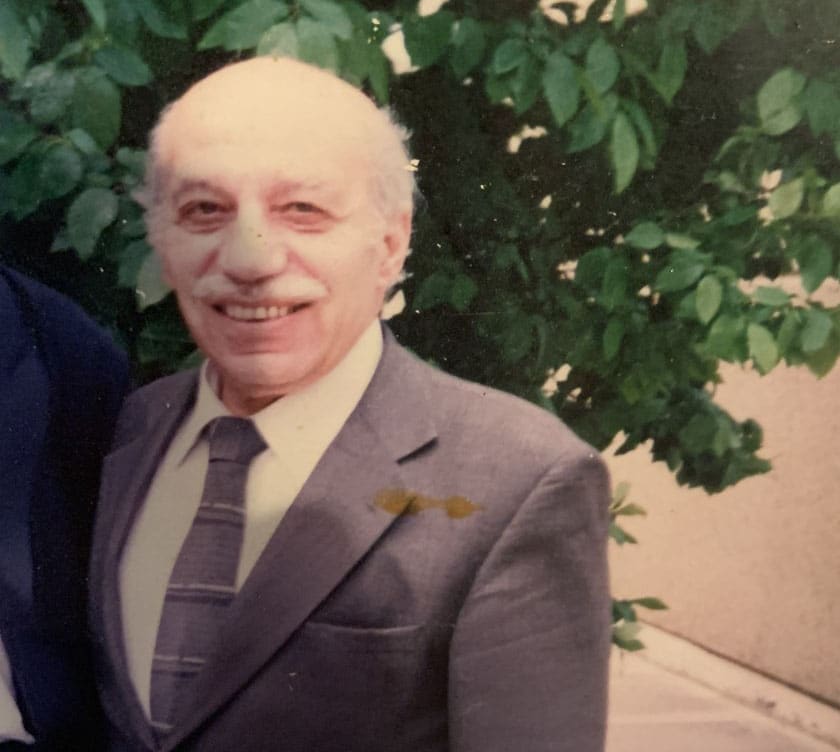Farewell to my friend George (Kokos) Demetriades
By Alper Ali Riza
George Demetriades formerly of Nicosia, latterly of East Finchley, north London, stalwart of the London Greek community, of Gray’s Inn, barrister-at-law, and close friend, died last Sunday aged 87.
After graduating from the Pancyprian gymnasium in the days when Greek nationalist fervour was at its peak, George was one of a number of Greek Cypriots who came to London to study law in the 1950s. It was a tempestuous time in the colony of Cyprus in its twilight years before independence. In 1955 an armed struggle began against British rule for union of Cyprus with Greece (enosis) that was to last for five years, which must have been difficult for students from Cyprus in UK.
Like other students from the far-flung British empire who were to become leaders after independence, many trained as barristers in the Inns of Court. Mahatma Gandhi, whose portrait adorns the walls at the Inner Temple library and who led India to independence in 1947, is the first and probably the best-known student-barrister to lead his country to independence.
Paradoxically, they returned home to practise English common law even as they rid their countries of British colonial rule. It is remarkable that although the British were forced to retreat from their empire, all their former colonies, including the US, retained the English system of law known common law of England.
George’s contemporaries in London included Spyros Kyprianou, a close personal friend, who became Archbishop Makarios’ foreign minister between1960-72 and president of the Republic of Cyprus (RoC) 1977-88; Tasos Papadopoulos, also a friend, who held a number of ministerial portfolios and was RoC president between 2003-08; and Nicos Rolandis, foreign minister 1978-83 and commerce and industry minister 1998-2003.
Compared to his contemporaries, George was not as directly involved in politics, but he was as patriotic and more erudite in the Greek language and culture than most of the enosis generation of London students.
For George and many Greek Cypriots of his generation the clamour for enosis in hindsight may have gone awry but it was not wrong, although even the most ardent supporters of the cause would concede that gifting a huge chunk of Cyprus to Turkey in an attempt to achieve it was both irrational and wrong from a Greek Cypriot point of view.
The initial demand for enosis led to independence and lost its idealist allure after the botched attempt by the Greek dictators to unite Cyprus to Greece in 1974, in which George was caught up after he returned to Cyprus to practise law with his old friend Kyprianou.
After 1974 he returned to the UK but remained attached to Cyprus and Greece; in the meantime although enosis receded as a national aim among Greek Cypriots, a more sophisticated version of union with Greece surfaced en passant when both Greece and the Republic of Cyprus became member states of the European Union – a political and economic union which provides Greece and RoC with as much enosis as is feasible and desirable.
I met George – Kokos as he liked to call himself – in Gray’s Inn common room while studying law where we would play chess and table tennis instead of furthering our careers in the law. He loved all sports physical and intellectual and confided in me once that much as he loved the law, what he really wanted to be was a sports coach.
Apart from chess and table tennis, he was a master of backgammon, a skilful snooker player and one of few Cypriots of his generation who understood and enjoyed test cricket. He was a passionate Arsenal fan in England and, as an old Nicosian, an Apoel fan in Cyprus. George liked to keep his mind occupied and when not engaged in a game with an opponent, I often found him solving jigsaw puzzles.
He had a wide circle of friends among the London Greek Community that included the late Greek shipping magnate Bluey Mavroleon, about whom he had many anecdotes of the fun they had in swinging London. He was very nostalgic of his days in old Nicosia too and he would talk enthusiastically about old Nicosia and the Anemomilos club and of his old friends, without realising I was younger and had no idea who or what he was talking about. In my day the in-nightclub in Nicosia was the Cosmopolitan.
He had a wonderful baritone voice did our George, and sang often to the delight of those of us with a taste for songs of old Athens and the New Wave and other Greek popular songs, which he would sing at the various Greek night clubs in the West End and north London.
My lasting memory of George was a few years ago driving back to his house after a successful day in court with a Greek woman friend, happy with the outcome, when they sang spontaneously in primo secondo mode the best rendition of Ax Annoulla tou Xiona I ever heard.
George is survived by his former wife Jenny, his son Harry and his wife Dawn and their six children, three boys and three girls: Costas, Anya, Nikos, Irini, Yiannis and Chrysanthi.
Alper Ali Riza is a king’s counsel in the UK and a retired part-time judge







Click here to change your cookie preferences